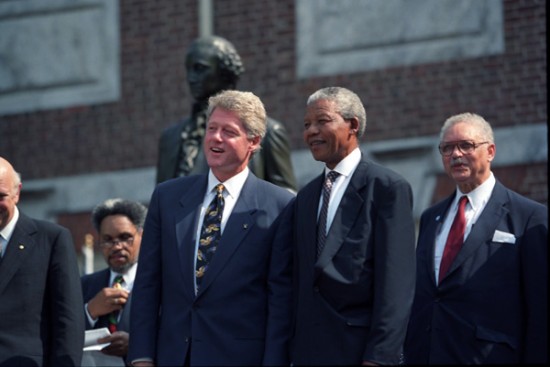
Nelson Mandela is a South African man who made it his life goal to speak for the oppressed. This largely includes the black men and women of South Africa, although his devotion to this cause has made him an inspiration for justice all over the world.
1. Nobel Peace Prize
In 1993, Mandela accepted the Nobel Peace Prize as an accolade to all people who have worked for peace and stood against racism, including his fellow members of the ANC and the people of South Africa. Mandela acknowledged that there were many who worked alongside him and continue to work with him to achieve the goals of justice that many in his country and around the world have worked tirelessly and sacrificed much for.
2. National Volunteer-In-Chief
Mandela was elected National Volunteer-in-Chief when the ANC launched its Campaign for the Defiance of Unjust Laws in 1952. The Defiance Campaign was conceived as a mass civil disobedience campaign. Mandela was charged and brought to trial for his role in the campaign. He was convicted of contravening the Suppression of Communism Act and was given a suspended prison sentence which prohibited him from traveling outside of certain areas.
3. ANC
Mandela is largely responsible for transforming the ANC into a mass movement. At the time of the ANC’s victory in 1948, Mandela had been elected to the presidency of both the Youth League and the Transvaal region of the ANC. In 1952, he became a deputy president of the ANC.
4. Becoming a Lawyer
Mandela was admitted to the legal profession. He opened a practice in Johannesburg, in partnership with Oliver Tambo, thus forming the first black legal office. Forced by other white lawyers to close down their practice, the two men met clients at a different location at odd hours in order to continue their work of providing legal aid to those who needed it most. He and his law partner continued to fight against the racism shown to them and represented other black South Africans, most of whom were also fighting against segregation.
5. Freedom Charter
Mandela played an important part in leading the resistance to the Western Areas removals and to the introduction of Bantu Education. He also played a significant role in popularizing the Freedom Charter, adopted by the Congress of the People in 1955.
6. Black Pimpernel
Mandela’s successful evasion of the police during the time that he was being sought after, earned him the title of the Black Pimpernel. It was during this time as the Black 7. Pimpernel that Mandela created a new section of the liberation movement where violent resistance became the solution to a time when the government was fighting their non-violent resistance with force. This transition would later bring much more harsh consequences with it once Mandela was caught.
7. Life in Prison
In 1962, Mandela left the country for military training and to arrange training for others. He was convicted and imprisoned for five years in November 1962 and later charged with sabotage and sentenced to life imprisonment.
8. Inspiration to the Oppressed
Mandela was released on 11 February 1990. Mandela continued to work towards attaining the goals of democracy, equality and learning. His life is seen as an inspiration to all who are oppressed and deprived.
9. 50 Honorary Degrees
Mandela has honorary degrees from more than 50 international universities and is chancellor of the University of the North.
10. State President of South Africa
Nelson Mandela was inaugurated as the first democratically elected State President of South Africa on 10 May 1994 and served until June 1999.

Leave a Reply